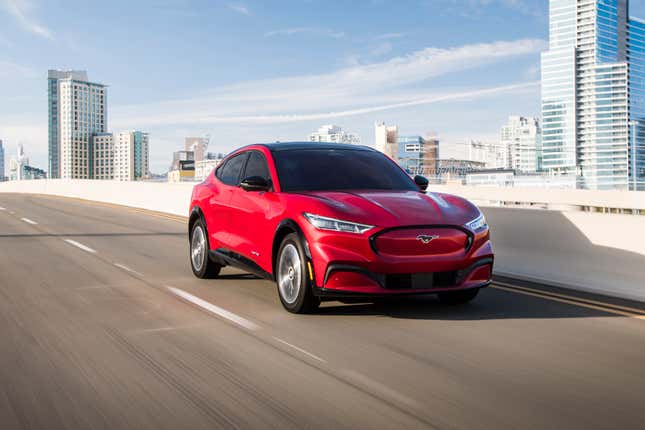
U.S. auto safety regulators have launched a new investigation into Ford Motor Co’s driver assistance technology after two electric Mustang SUVs crashed into stationary cars, resulting in at least two deaths.
The National Highway Traffic Safety Administration (NHTSA) said it would investigate the Detroit carmaker’s BlueCruise, a partially automated driver assistance software included in Ford’s Co-Pilot 360 Active package. BlueCruise, which was introduced in 2021, is only available on certain roadways and ensures drivers are paying attention to the road using cameras.
The NHTSA’s Office of Defects Investigation said it received two complaints of Mustang Mach-E vehicles colliding with stationary cars while BlueCruise was enabled. Regulators were able to verify that the technology was enabled in both vehicles directly prior to the crashes. Both collisions occurred during the night and each resulted in at least one fatality, regulators said.
The NHTSA has opened a preliminary investigation to evaluate BlueCruise’s driving and driver monitoring capabilities. About 130,000 2021-2024 model year Mustang Mach-E vehicles are equipped with the technology, according to the NHTSA’s report.
The investigation comes weeks after the National Transportation Safety Board (NTSB) opened an inquiry into a March 3 crash in Philadelphia in which two cars that were standing still on I-95 were struck from behind by a Mustang Mach-E. The NTSB has also opened an inquiry into a fatal crash in which a Mustang Mach-E drove into the back of a stationary Honda CR-V in San Antonio, Texas.
“We are working with NHTSA to support its investigation,” a Ford spokesperson said.
The NHTSA also recently opened a new inquiry into Tesla’s Autopilot, another driver assistance system, after ending a nearly three-year investigation. The regulator is probing the Austin, Texas-based company’s recall of more than 2 million electric vehicles — which make up nearly all of Tesla’s vehicles on the road in the U.S. — in December. The regulator said it had identified concerns with the software fix issued to those vehicles.
The NHTSA said Autopilot didn’t sufficiently require driver’s attention, even as it made drivers more confident. At least 13 crashes investigated by the NHTSA involved one or more deaths and “many more” serious injuries. The regulators added that “foreseeable driver misuse of the system played an apparent role” in those incidents.
The new Tesla recall investigation covers model years 2012 through 2024 Model Y, X, S, 3 and Cybertruck EVs in the U.S. equipped with Autopilot. Tesla last week recalled 3,878 Cybertruck electric pickups over faulty accelerators.
Both Ford’s BlueCruise and Tesla’s Autopilot flunked the Insurance Institute for Highway Safety safety tests for driver assistance systems earlier this year. Both systems — in addition to Ford’s Adaptive Cruise Control with Stop & Go and Lane Centering Assist and Tesla’s Full Self-Driving — earned “poor” scores from the auto safety nonprofit.